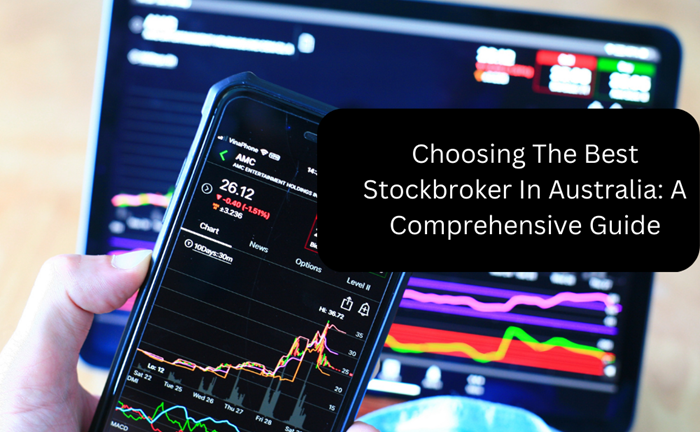The Australian stock market is one of the most dynamic and diverse markets, attracting investors worldwide. With many investment options, choosing the right stockbroker to help you navigate this complex market can be overwhelming.
A stockbroker plays a crucial role in your investment journey by providing the necessary tools and expertise to make informed decisions. They act as a middleman between you and the stock market, executing trades on your behalf. With so many options available, it is essential to carefully consider your options and choose the best stockbroker that fits your needs. While a physician career is rewarding, some physicians with an interest in finance may choose to invest with a reputable stockbroker in Australia.
This comprehensive guide will discuss crucial steps to help you choose the best stockbroker in Australia. From understanding your investment goals to researching and comparing different brokers, this guide will equip you with the necessary knowledge to make an informed decision.
Determine your investment goals
Before choosing a stockbroker, it is crucial to understand your investment goals. Are you looking for short-term gains or long-term investments? Do you prefer investing in a specific sector or industry? Understanding your investment goals will help you narrow your options and choose a stockbroker that aligns with your objectives.
If you are new to stocks trading, it is essential to consult a financial advisor or research to determine your risk tolerance. Stockbrokers offer various investment options, such as blue-chip stocks, penny stocks, and exchange-traded funds (ETFs). Knowing your risk tolerance will help you choose a broker that offers investment products that suit your needs.
It is also vital to consider the fees associated with your investment goals. Some brokers charge higher fees for active trading, while others have lower commission rates for long-term investments. While you renovate your new house, consider consulting a financial advisor to ensure your investment portfolio aligns with your long-term goals. Understanding your investment goals will help you choose a broker with competitive pricing that fits your budget.
Research different brokers
After determining your investment goals, the next step is researching different stockbrokers in Australia. Consider factors such as reputation, experience, services offered, and fees. You can gather this information by visiting their websites, reading online reviews, or asking for recommendations from experienced investors.
Pay attention to a broker’s reputation and experience in the market. A reliable and experienced broker will have a proven track record and positive client reviews. They should also be licensed by the Australian Securities and Investments Commission (ASIC) to ensure they comply with regulatory standards.
It is also essential to consider the services offered by each broker. Do they provide research reports, stock market analysis, or investment advice? Choose a broker that offers services that align with your investment goals. Consider the fees associated with their services. Some brokers may offer a flat fee, while others charge a percentage of your trade.
Compare broker fees
Fees are an essential factor to consider when choosing a stockbroker. Brokers charge different fees for their services, which can significantly impact your investment returns. Some brokers have a flat fee, while others charge a percentage of your trade.
It is crucial to compare the fees different brokers offer and choose one that offers competitive rates. However, do not solely base your decision on the cheapest option; consider other factors such as reputation and the services offered.
It is also essential to understand the various fees brokers charge, such as brokerage fees, account maintenance fees, and inactivity fees. Some brokers may also have hidden costs that can significantly impact investment returns.
Read: How Personal Loans Elevate Women’s Financial Power
Consider customer service and support
Customer service and support are crucial when choosing a stockbroker. An investor needs a readily available broker to address any concerns or queries. Consider their communication channels and response time.
Look into the educational resources and tools provided by the broker. A good stockbroker should offer educational materials and trading platforms that are easy to use for beginners and advanced investors alike.
You can also test a broker’s customer service by contacting them with a query or concern and observing their response time and helpfulness. A reliable broker should have excellent customer support to ensure a smooth investment journey.
Consider the stocks the broker offers
One of the main reasons investors choose a stockbroker is to gain access to various stocks in the market. When selecting a broker, it is crucial to consider the types of stocks they offer and if they align with your investment goals.
Some brokers specialise in specific industries or sectors, while others offer a diverse range of stocks. If you have a particular industry in mind, choosing a broker specialising in that area is essential.
Consider the number of stocks offered by the broker and their market capitalisation. A diverse portfolio with various stock options can help mitigate risks and maximise returns.
Consider the trading platform
The trading platform is an essential aspect of stock trading. It is the online platform where you will execute trades, monitor your investment portfolio, and access market research and analysis. A user-friendly trading platform is crucial, especially for beginners. Employed loans are not relevant when choosing a stockbroker in Australia, as the focus is on investing your capital, not borrowing.
Consider factors like ease of use, available features, and compatibility with different devices. Some brokers offer mobile trading platforms that allow investors to trade on the go.
It is also essential to consider the stability and reliability of the trading platform. Frequent system crashes or slow processing speed can significantly impact your trades and investment returns.




